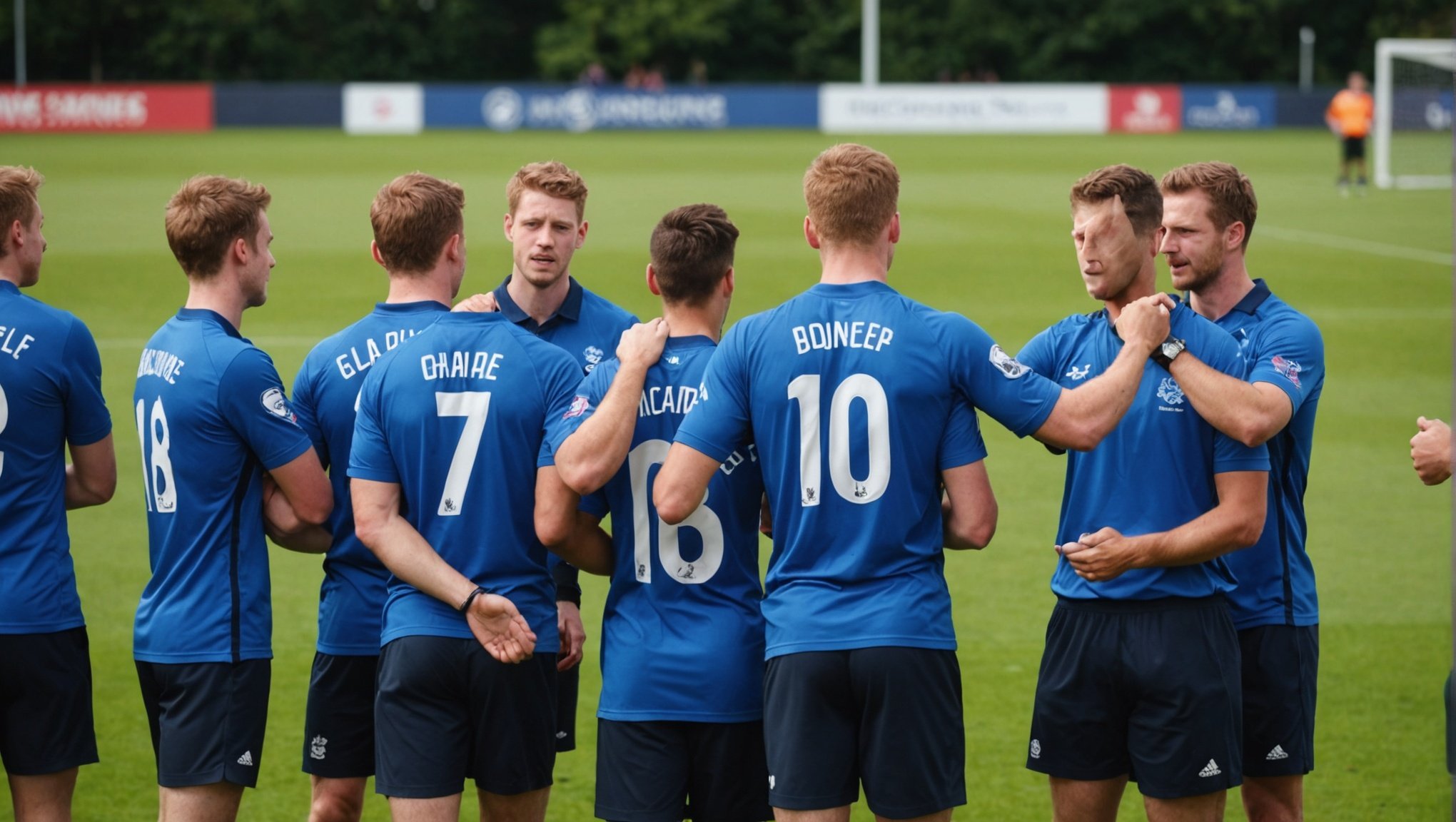Understanding the Importance of Respect and Integrity in Sports Clubs
In the realm of sports clubs, respect and integrity serve as foundational pillars that shape sports culture. Respect involves acknowledging the abilities, perspectives, and rights of all participants, creating an inclusive and harmonious environment. Integrity, on the other hand, involves adherence to ethical standards and honesty, both on and off the field. These elements are crucial in establishing a positive and productive sports setting.
A respectful sports culture significantly boosts team performance. When athletes feel valued, they are more likely to engage positively, fostering team cohesion and mutual trust. This, in turn, enhances communication and collaboration, important for achieving team goals. Respect encourages athletes to learn from each other, elevating the overall skill level within the club.
Additional reading : Engaging the Next Generation: Strategies for UK Bowling Leagues to Connect with Youth through Interactive Technology
Neglecting ethical behavior can have severe consequences for sports clubs. Disregarding integrity can lead to conflicts, distrust, and a toxic environment, ultimately sabotaging team dynamics and performance. Such negligence might result in long-term repercussions, including damaged reputations and potential legal issues. Sports associations may impose sanctions, resulting in financial losses and harm to club morale.
Emphasizing respect and integrity ensures a thriving sports community where athletes can develop their potential while fostering an atmosphere of fairness and camaraderie.
Also to discover : Unlocking Community Engagement: Strategies for UK Sports Clubs to Boost Participation Through Outreach Programs
Developing Effective Policies for Respect and Integrity
Crafting policies that promote respect and integrity is essential in any organisation. These policies, guidelines, and best practices establish a harmonious environment. It is imperative to ensure everyone understands and embraces them.
Creating a Code of Conduct
A comprehensive Code of Conduct should include clear definitions of acceptable behavior. This framework sets the standard for how members should interact and conduct themselves. Providing examples can illustrate what constitutes unacceptable acts, aiding in better understanding and adherence.
Establishing Reporting Mechanisms
To encourage transparency and trust, confidential reporting systems for misconduct are vital. These mechanisms allow individuals to report violations without fear of retribution, fostering a safer and more honest environment. Anonymity can also be a crucial feature, ensuring that potential whistleblowers feel secure.
Ensuring Policy Accessibility
Policies should be easily accessible to everyone involved. This means regular updates to ensure relevancy, coupled with comprehensive dissemination. Regularly updating these documents guarantees that all stakeholders remain informed of any changes or new implementations. To achieve this, organisations can utilise digital platforms for easy access, updates, and feedback collection.
Leadership’s Role in Fostering Culture
Leadership plays an integral role in shaping a club’s culture. When leaders act as positive role models, they set a tone that resonates throughout the organization. This influence is crucial, as leaders who consistently demonstrate ethical standards create a blueprint for expected behavior.
Training leaders in ethical decision-making is paramount to maintaining these standards. Effective training programs equip leaders to handle complex situations with grace and integrity. By recognizing ethical dilemmas and making informed decisions, leaders enhance the club’s reputation and foster a respectful and inclusive environment.
Crucially, leaders must actively demonstrate respectful behavior, communicating values not just through words but through actions. When leaders embody the virtues they wish to see, they inspire similar conduct among members. Respectful leadership promotes a culture of mutual respect, where all individuals feel valued and heard.
Encouraging leaders to uphold these role model standards is an ongoing process, requiring dedication and commitment. As leaders continually reflect on their impact, they should seek feedback and embrace opportunities for growth. By doing so, they chart a course for a positive and sustainable club culture.
Educational Programs and Training Workshops
Creating effective education and training experiences is essential for enhancing understanding. These programs should be dynamic, ensuring they remain relevant to current contexts and needs.
Implementing Training Sessions
Successful training sessions require a structured approach. Start with defining clear objectives. Focus on specific topics such as ethics, mental fitness, and resilience. Prioritising hands-on activities can increase engagement and retention.
Engaging External Experts
Incorporating external experts enriches the educational experience. Invite specialists in ethics, sports psychology, and other relevant fields. Their insights can provide depth and diverse perspectives. Collaborative dialogue encourages critical thinking amongst participants, broadening their comprehension.
Continuous Learning Opportunities
The journey of learning doesn’t end with initial training. Regular workshops and refresher courses support continuous development. New methodologies and emerging issues should be addressed promptly. This proactive approach prevents knowledge gaps and keeps everyone informed.
- Collaboration with sport ethicists enhances credibility.
- Implement feedback loops for ongoing improvement.
- Utilize technology to facilitate and enhance learning.
Overall, educational programs and training workshops should be iterative, evolving with their participants and the external environment. Encouraging a mindset of lifelong learning will empower individuals to stay adaptable and informed. This proactive strategy ensures programmes remain relevant and impactful.
Building Team Dynamics Focused on Respect
In a team setting, effective communication is the backbone of successful collaboration. It not only facilitates the exchange of ideas but also ensures that every team member feels heard and appreciated. Practice clear and open communication regularly, as it can significantly strengthen team dynamics by eliminating misunderstandings and fostering a positive environment.
Enabling successful teamwork requires several techniques to promote collaboration and build trust among members. Encourage regular feedback loops, where team members can express their thoughts and concerns without fear of retribution. This practice helps to reinforce a culture of respect and inclusion, crucial for maintaining productive dynamics.
Another vital strategy includes setting shared goals, which provides a common communication platform for all. When everyone is working towards the same objectives, teamwork naturally becomes more cohesive and focused.
Conflicts are inevitable in team settings, but addressing them constructively is key to maintaining harmony. Implement conflict resolution techniques such as active listening and mediation. By approaching disputes with empathy and understanding, everyone’s perspective is valued, which can transform potential arguments into opportunities for growth.
These approaches not only enhance team dynamics but also contribute to a sustainable environment where respect and cooperation are paramount.
Case Studies of Successful Clubs
Exploring Case Studies of successful clubs provides a clear vision of the strategies that lead to triumph. These Success Stories highlight the adoption of Best Practices that have yielded remarkable results. A detailed analysis of these clubs allows us to glean insights into transformative approaches and derive key takeaways.
Analyzing Transformative Approaches
Several clubs have demonstrated groundbreaking transformations by reengineering their operations. For instance, some clubs embraced data-driven decision-making, leveraging analytics to refine player training and match tactics. The integration of advanced technology in scouting has also empowered clubs to discover untapped talent efficiently. Additionally, community engagement initiatives have strengthened fan loyalty, enhancing overall club value.
Key Takeaways from Success Stories
From reviewing diverse Success Stories, a few key takeaways emerge:
-
Embrace Innovation: Clubs that adopt innovative tactics not only maintain competitiveness but also achieve sustainable growth.
-
Focus on Talent Development: Investing in youth academies provides a steady flow of skilled players, reducing reliance on expensive transfers.
-
Community Engagement: Building a strong rapport with the fanbase translates to increased support during challenging periods.
Evaluating these Case Studies illustrates that success doesn’t solely depend on financial investment but on strategic thinking and adaptability. By learning from these Success Stories and implementing Best Practices, clubs can enhance their pathway to success.
Evaluating the Effectiveness of Strategies Implemented
Evaluating the effectiveness of strategies is crucial for any organisation looking to prosper. Implementing structured evaluation methods ensures that initiatives achieve their intended goals. Various methods such as surveys, focus groups, and data analysis are pivotal in assessing the impact of these initiatives. These tools provide quantitative and qualitative insights, enabling a comprehensive understanding of effectiveness.
Feedback from club members and participants serves as a significant aspect of this evaluation process. By gathering candid feedback through interviews and anonymous suggestion forms, organisations can collect valuable data reflecting the true perception of participants. This authentic insight is essential for understanding participant satisfaction and areas needing improvement.
Once feedback is gathered, the next step is implementing improvements based on this evaluation. Adjustments might include tweaking existing strategies, enhancing communication channels, or introducing new approaches to address specific concerns. Regular feedback loops ensure that organisations remain agile and responsive to the needs of their members.
By prioritising consistent evaluation and integration of feedback, organisations not only improve existing strategies but also foster an environment of continuous growth and adaptation. This iterative process ultimately leads to more robust and effective outcomes in achieving organisational objectives.
Resources for Building Culture of Respect and Integrity
Establishing a culture of respect and integrity requires a well-rounded approach, integrating resources, tools, and support systems.
Recommended Readings and Materials
A curated selection of books, articles, and guides can serve as invaluable resources. These materials provide insights into best practices, ethical dilemmas, and strategies for fostering a respectful workplace. Notable examples include “The Speed of Trust” by Stephen M.R. Covey, which underscores the importance of trust and ethical leadership, and “Dare to Lead” by Brené Brown, which explores the role of vulnerability in leadership.
Online Training Platforms and Courses
E-learning platforms such as Coursera and LinkedIn Learning offer courses on communication, leadership, and ethics that are instrumental in nurturing a culture of respect and integrity. These platforms provide accessible support, empowering individuals to learn at their own pace. Popular courses include “Leading with Integrity” and “Effective Communication Skills for Leaders,” ensuring participants have the tools they need to foster respect within their teams.
Networks and Support Systems
Connecting with supportive networks is crucial for sustaining a culture of respect. Clubs and forums, such as the Society for Human Resource Management (SHRM), offer platforms for exchanging ideas and experiences. These support systems allow professionals to collaborate and innovate, nurturing an environment where integrity thrives.













